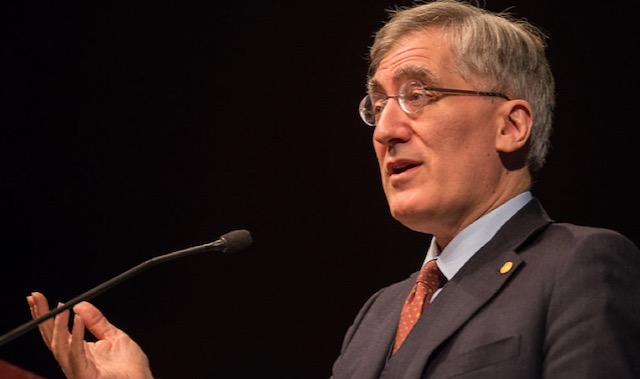American Politics, Pornography
Princeton scholar calls on Attorney General Bill Barr to prosecute the porn industry
Last fall, four Congressmen sent a letter to Attorney General Bill Barr requesting that the Department of Justice begin enforcing laws on obscenity in order to reduce the amount of hardcore pornography being consumed be children. The letter triggered a sort of civil war on the Right, with outraged libertarians defending the porn industry against conservatives who pointed out that it was long past time we took another look at digital porn’s cultural devastation. I had a conversation about this debate with Terry Schilling, who wrote a fascinating essay on how the government can take action against pornography for First Things, on my podcast some time ago.
Earlier this month, Princeton professor and conservative intellectual Robert P. George, one of social conservatism’s greatest champions, added his own voice to the conversation with a follow-letter to the attorney general:
January 13, 2020
The Honorable William Barr
Attorney General
United States Department of Justice
950 Pennsylvania Avenue, NW
Washington, DC 20530-0001
Dear Attorney General Barr:
I am writing to request clarification regarding current DOJ policy for the enforcement of existing obscenity laws — specifically 18 U.S.C. § 1460-1470 — and to inquire whether DOJ considers these statutes applicable to online pornography. When these obscenity laws were enacted, they were intended to prohibit the physical transfer of obscene materials. However, as technology has advanced, the market for these materials has shifted away from physical locations, indisputably regulated under these statutes, to the Internet in the form of online pornography. Although DOJ’s website includes fact sheets confirming that obscenity law applies to online material, it appears to me that DOJ is not prosecuting a sufficient number of federal obscenity cases to discourage its proliferation.
As everyone knows, the online pornography industry has exploded. There has been a dramatic rise in illegal pornography production and distribution. Hotels, cable and TV companies, and Internet pornography distributors regularly sell pornography featuring horrific themes such as the rape of teenagers, incest, sexual assault, sex trafficking and slavery, suffocation, bondage, and even cartoon pornography targeted at minor children. Racism and misogyny are rampant. A 13-year-old with a smartphone now has unlimited access to his own personal theatre of sexual horrors.
Extensive evidence demonstrates severe harm caused to children and youth exposed to pornography; increasingly, studies find harm is caused to adults as well. Pornography exposure can impact brain development and functioning, contribute to emotional and medical illnesses, shape deviant sexual arousal (e.g., animal and/or child pornography use), as well as problematic or harmful sexual behaviors such as child-on-child harmful sexual behaviors (occurring in schools, playgrounds, homes or other settings).
Recent research indicates that pornography is potentially biologically addictive, which means the user requires more novelty, often in the form of more shocking material, in order to be satisfied. This addiction leads to increasing use of pornography featuring themes of risky sexual behaviors, extreme degradation, violence, animals and child sexual abuse images (i.e., child pornography). As a result, 15 state legislative bodies have passed resolutions declaring pornography to be a “public health crisis.”
The proliferation of online pornography and the great difficulty of filtering it so children and youth are not exposed is an issue of growing concern to the public, and particularly to families. Therefore, I would be grateful to DOJ for clarification of the following questions:
- How does DOJ define “obscenity”?
- Does online pornography qualify as “obscene”? What kinds of online
pornography would qualify as “obscene”?
- Does DOJ believe online pornography is subject to regulation under 18 U.S.C. §
1460-1470?
- What efforts have been undertaken to date by DOJ to prosecute violators of
obscenity statutes, especially online offenders, under this administration?
Thank you for your attention to this matter.
Sincerely,
Robert P. George
McCormick Professor of Jurisprudence
Director of the James Madison Program in American Ideals & Institutions
Princeton University
I am very much looking forward to the response.









This is a good letter. I am very curious to see the response as well.
I remember being exposed as a child, myself when the internet wasn’t a thing yet. I am very concerned now as a mother myself that the internet is too accessible to children and young people and even adults.
These types of things really do traumatize some people and causes others to have problems.
Lord willing, a law is passed that it be next to impossible to retrieve this type of material.